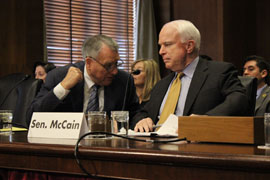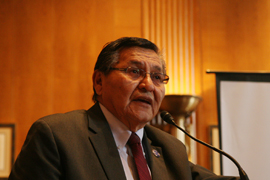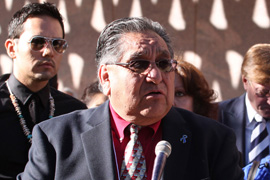Cronkite News has moved to a new home at cronkitenews.azpbs.org. Use this site to search archives from 2011 to May 2015. You can search the new site for current stories.
Senators urge action on water-rights bill in meeting with tribal leaders
WASHINGTON – Arizona’s senators urged tribal leaders Thursday to move quickly on a proposed settlement of water-rights claims so they can push the bill through Congress before this session ends.
In separate closed-door meetings with Navajo and Hopi leaders in Tuba City, Republican Sens. Jon Kyl and John McCain stressed the importance of quick action, said those who attended the meetings.
A bill Kyl introduced in February would require that the tribes cede claims to Little Colorado River water in exchange for three projects to deliver safe drinking water. But the senators said the plan needs tribal approval before they will move it forward, said those at the meetings.
“We feel the pressure to come up with a resolution either of supporting or not supporting the water act,” said Erny Zah, spokesman for Navajo President Ben Shelly.
“Right now we are going to try to expedite the position only because the window of Congress is shrinking to be able to get something like this through,” Zah said.
Navajo Chief of Staff Sherrick Roanhorse said the senators are pushing for a tribal resolution by early summer. He said the Navajo Nation will hold seven public hearings this month and will submit comments to the tribal council before action is taken.
Hopi Chairman LeRoy Shingoitewa said the water settlement did not come up in his tribe’s meeting with the senators. While he supports the plan, he said he would wait to hear from the Hopi people.
“Whatever we hear from the people, that will be the decision made,” he said.
Attempts to reach Kyl and McCain Thursday were not successful.
Zah said as many as 200 protesters opposing the bill showed up outside the meeting, which was requested last week by the senators.
Some opponents have cautioned that the settlement, while providing much-needed water, could come at too great an expense.
While the Hopi have sued the federal government over arsenic and uranium in their drinking water, for example, the bill would require that they waive future claims over water quality and loss of traditional springs.
Opponents to the settlement could not be reached Thursday, but said in a statement last month that promised water projects are dependent on future congressional appropriations and “contain empty promises.” They also said tribal government “is in the process of negotiating away what remains of our sovereignty, our precious water rights.”
Shingoitewa invited opponents to come up with something better.
“I would like to hear from them what their solution is to provide water for all 12 villages, plus any future communities that might be developed on Hopi lands … for generations to come,” he said. “So far, I haven’t heard any solutions from them.”
Zah said some leaders at the Navajo meeting also expressed concern that Kyl was more interested in protecting the Navajo Generating Station, a coal-fired power plant that has been the center of controversy over its impact on tribal water. He said Kyl denied the charge.
While Navajo leaders originally applauded the settlement, Zah said Shelly is currently going through the bill “with a fine-toothed comb” and that a decision would be left to the people.
“Publicly the president has stated that he supports the bill; however, he’s also a leader who will do what the people ask,” Zah said. “Since the bill was first introduced, there have been details that have come out. His eyes are wide open.”
Today’s meeting was limited to tribal leaders, a decision the drew criticism from Navajo Nation Council Speaker Johnny Naize. He said he planned to ask for another meeting with the senators, in public.
“All agreements that will be made by Council on water-rights settlement will be done so with transparency in public sessions,” Naize said in a statement before Thursday’s meeting.
Shelly, in a written response, said there would be other public meetings and agreed that the complex issue “cannot be settled in one meeting with U.S. senators.”
But while the settlement needs the support of people, his statement also reminded tribal leaders, “We must lead our people, not react.”









